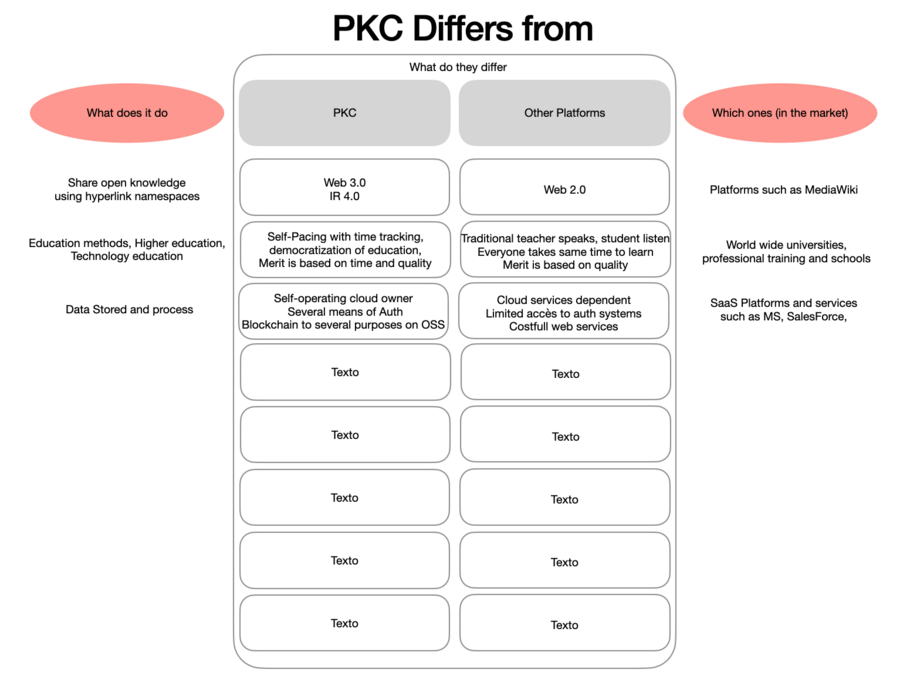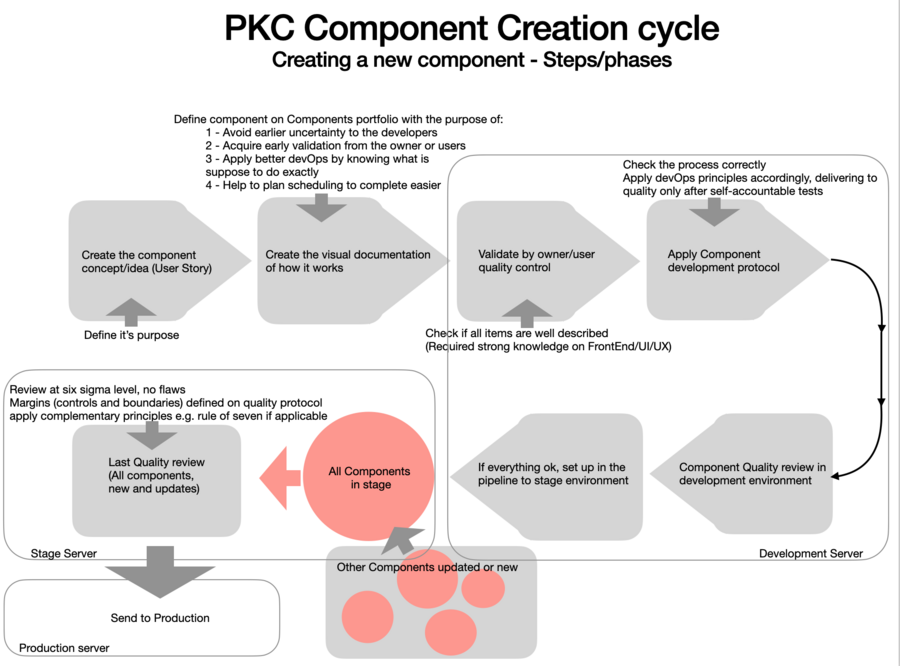Talk:Personal Knowledge Container
Daily reporting
The Purpose of these reporting is to check on daily progress until PKC PMO defines how to report its data.
It's also for some items to be better defined and/or validated
Week Report 25th April 2022
=== Studied and understanding according to this presentation
- A new diagram was elaborated in order to explain all the slides in a whole, summarizing all content
- * The question on "What PKC differs from others" still is not answered
- *
- There is certain terms that are not 100% congruent
Week Report 23th April 2022
PKC PMO
General guidelines are defined
mising:
- Define products and projects
- Revise and edit pages related from organization PKC such as W3T3 or Meta
- Understands better on Web 1.0, 2.0 and 3.0
Report 18th April 2022
In what PKC differs form others?
PKC as a (super) product in the market, or as it is said in countries like USA, PKC as a (super)Brand, is unique, innovative, disruptive comparing with the market options at the current moment of 2022.
PKC is not a simple platform, it has several purposes and its complexity also means several problems to solve
The following image is still in construction and pretends to demonstrate everything that distinguish PKC from other technologies or ideas
PKC is built under what techs?
It's important to define the technologies but by sections, purposes, and other means to find it logic to other departments such as HR, management and Stakeholders supporters such as funding groups
The following file is still in construction ...
Report 15th April 2022 - Holy Friday (Easter)
PKC Component Creation cycle
(Known in Agile as User Stories, common in project management as deliverables/work packages)
on construction...
Software of today suffers several phases of validations and iteration developments.
This means that several means of document information helps repeating errors.
The process requires the following type of documents (or more accordingly to each environment):
- Architecture relation diagram
- Components Portfolio
- Security Protocol
- Quality protocol
- Stress test and quality protocols
- Component Development protocol
- Project theme (Layout) structure (can be used with techs like storybook)
Report 14th April 2022
- Update on discussions W3T3 and PKC
- studied a little bit about the concepts of Web 1.0, 2.0, 3.0
- Discussion points
studied a little bit about the concepts of Web 1.0, 2.0, 3.0
Noted on W3T3 discussion
Lost some time on reading more about it, I would advice in reviewing this later as it's not 100% coherent to the user as also not sure if I can agree in the descriptions.
Discussion points
As understood, you are going to need help not only in the PMO but also on Editing. Like playing a little bit of Max Perkins. The reason is that all pages about PKC must be coherent between with the same page structure so that it can be easier to the user to learn and read. I'll try to divide the 2 roles acordingly.
Report 13th April 2022
Summary:
- Information update about PKC and its portfolios
- Started to set up PMO definition and structure
- Updated W3T3 budget (error on Gdocs solved)
- List of points to be defined (pending issues)
Information update about PKC and its portfolios
Definition update about PKC: PKC is not a project is an Idea (a project has closure and PKC is eternal).
PKC content must be pattern and re-organize all volatile information, requiring an editing comprehension to make it more user friendly and people accessible This also intents to prevent continuous re-editing on the same context, using a “branching process” instead.
PKC is composed by the following portfolios: Meta University; Inter-Organizational Workflow; PKC Engine; PKC Spin-off
PKC is managed by a state-of-the-art PMO (PKC PMO) based on a Disciplined Agile approach (PMI)
PKC first project is W3T3
Started to set up PMO definition and structure
Created the page with PKC PMO namespace and it will define all the Knowledge Areas (According to PMI) of PKC environment, such as: (not completed yet)
- Integration
- Scope
- Schedule (time)
- Cost (Budget)
- Quality
- Resources (HR/Materials/Team)
- Communications
- Risk Management
- Procurement
- Stakeholder
PKC PMO will also use Track on performance platformduring 2022 in order to learn how to operate under time management but also to understand how can it take advantage from technologies such as Apollo and APIs/BackEnd communication into third party platforms
Updated W3T3 budget
(Still Missing the discretionary budget, it's on construction just like P&L, with payments/Install per month)
List of points to be defined
Question 1:
- What are the Technologies to be used on PKC engine?
- (Currently is basically PHP however to become more state of the art as a web app)
- Are we going to work on:
- React framework
- Typescript
- Nest instead of PHP
- others, to be define...
- Objective is HR:
- Note: Define the technologies to define better our team
Question 2:
- (Mentioned before) can I allocate 1 person from my team, she is very good in React, understands well Apollo and designed many of the components in documentation/portfolio?
- Note: Engaging developers take time, if they are not aware of technology 100% they can take longer.
- We also need someone with good experience in documentation
- Also, about hiring a project assistant
- I think I can hold 2 months until we get a team defined, no worries, we can spare some money
- We can hire when I get to Bali in a couple of months when assignments start
Question 3:
- A template sample is already implemented for possible contract agreement types in a new PKC templates page and I will put more types.
- But instead of NDA, I wrote the fact that we are an OSS community therefore everything we do we are transparent and also because people are responsible for their own actions, therefore we don't need NDAs.
- Just confirm if you agree on the principle
Question 4:
- Define a temporary organization body:
- What is the name of the organization
- (even if it's a temp organization it has to be an official legal name, can't be just PKC or meta)
- VAT number
- (VAT numbers are necessary for financing/Billing and invoice purposes. We can't buy or pay anything without VAT number)
- Who will pay suppliers, salaries and costs
- (who issues the bank transfer is important so that it should be noted as part of a recurrent action every month or previously/after events)
- (Ben can be the releaser of the transfers, but not necessary the operational of making them, normally it's done by a financier like head of accounting or CTO that has access to companies account but can't make anything without the president or CEO or head of the organization approval)
- How to manage receipts of payments/installs
- (Before having the accounting system, in the beginning might be possible to handle with some software simpler, it depends on the country)
- (In USA it's not necessary a professional, in Portugal you have to hire a professional even for selling online used stuff)
- Contact responsible person
- (the main person accountable of that organization body, in companies it's the partners or CEO; in ONGs it's the president or similar)
- Email responsible person
- (same as previous)

